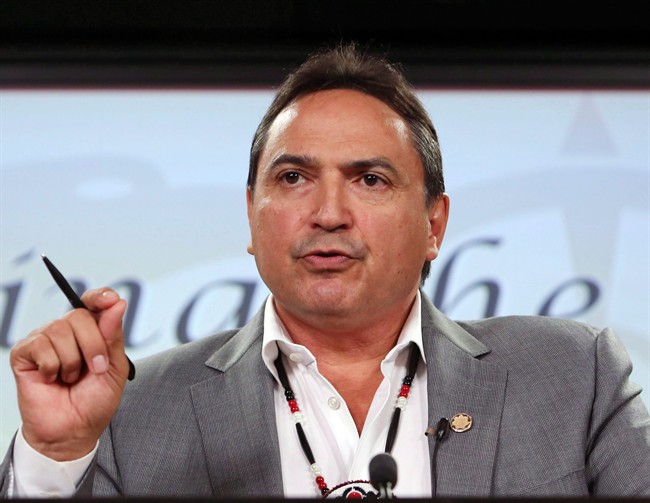WINNIPEG — Canada’s top First Nations leader says police should brace themselves for some blame in an upcoming inquiry into missing and murdered indigenous women.

Assembly of First Nations National Chief Perry Bellegarde says fingers will be pointed during the inquiry, which is expected to last two years.
“You guys didn’t do an adequate job. You didn’t put enough human and financial resources into the research and the investigation surrounding all these cases involving First Nations women,” Bellegarde said Wednesday in a speech to police chiefs from across the country.
“That’s what’s going to happen. You know that. I know that. So what is your answer?”
RELATED: Liberals launch first phase of inquiry into missing, murdered indigenous women
Police forces should start compiling statistics and thoughts now, he suggested. They should figure out how to showcase what they’re doing well, but be equally prepared to examine their shortcomings.
Many people still stereotype indigenous people as “stupid, lazy, drunk, (and on) welfare,” he said.
“Be big enough to show that more work needs to be done to improve the system.”
The federal government is expected to set a mandate this summer for the long-awaited inquiry into about 1,200 missing and murdered indigenous women.
RELATED: How can Canada make an inquiry on missing, murdered women successful?
A report released Wednesday summarizing public consultations suggested law enforcement should address “delays in responding to reports of missing indigenous women and girls.”
The government report also says police should address “systemic racism” and look at how officers treat indigenous women, girls and their families.
Saskatoon police Chief Clive Weighill, head of the Canadian Association of Chiefs of Police, said some of the criticism likely to come out of the inquiry is justified.
“There has been a lot of controversy right across Canada for decades now about police involvement with missing and murdered indigenous women,” Weighill said. “I think the inquiry will hopefully lay some of that to rest or hold some people accountable.”
But he also said police have changed the way they handle such cases. They don’t wait 24 hours to start investigating a missing person, work more closely with families and have put in safeguards to ensure cases don’t fall through the cracks.
A monument to missing and murdered indigenous women is being built in front of the police headquarters in Saskatoon, Weighill pointed out.
“The world has changed in the last decade.”
Nahanni Fontaine has been working for years with families who have lost loved ones.
When an indigenous woman was reported missing, police did not devote the same resources to the investigation, she said. Many families took the search into their own hands by putting up posters and talking to anyone who might have information about their daughter, sister or mother.
The situation has improved but there is still more work to be done, Fontaine said. For one, police need to build trust with the indigenous community.
“We still have racism. We still have sexism,” said Fontaine, a newly elected Manitoba NDP member of the legislature. “When you combine all those, the brunt of it is borne (by) indigenous women.”

Comments